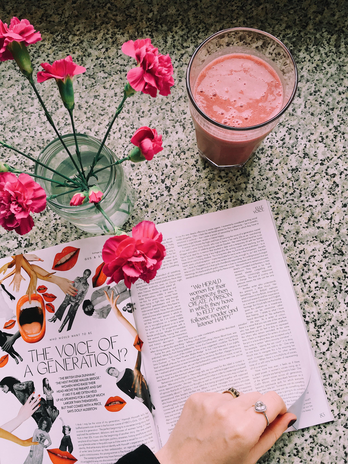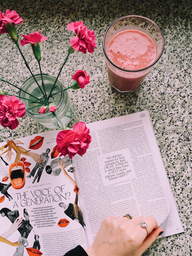“Caring for myself is not self-indulgence, it is self-preservation, and that is an act of political warfare.” (Audre Lorde)
How many times a day do you feel like you need to change something about yourself? In her TED talk, journalist Tracey Spicer says that the average amount of time women spend on grooming, getting dressed, and picking outfits in their lives is 3276 hours, compared to only 1092 for men.
Different types of self-hatred are easier to advertise to consumers because they’re already built into society. Men are often given messaging that they’re not “strong” or “powerful” enough. From car ads to razor commercials, men are shown taking risks, having agency, and being the “breadwinner” because of whatever product is being sold.
Women, on the other hand, are often given the messaging that without this product they will be undesirable. Especially in advertisements for “anti-aging” products, women are given messaging that our worth lies in our beauty, and our beauty lies in our youth. It’s not just the beauty industry. Countless other companies try to sell their products under the guise of “self-improvement.” Personal care and hygiene is often seen as feminine (think of men in the 2000s who were described as “metrosexual” because they styled their hair or washed their face). Advertisers will take a necessary thing like personal hygiene to an unnecessary level, making up “crucial habits” that have no backing in science. Not shaving body hair is so often seen as unhygienic for a woman, even though this is historically fairly new and has almost never been looked at in the same way as unhygienic for a man to avoid.
Most of the time, I think the advertisers using “self care” as a buzzword aren’t talking about true self care. They don’t care if you’re going on a walk or finally putting the empty glasses on your desk in the dishwasher. Self care in this day and age has been over-commodified, and I think the so-called self care industry thrives off of guilt and shame. When, exactly, did self-love and self-care turn into $30 single-use face masks, shiny new products, unnecessary supplements, and hyper-consumerism? Self-hatred is incredibly profitable. Entire industries can be propped up to fix the self-hatred their advertisers create for themselves.
Interest in self care peaks when times are tough. Google searches for “self care” reached an all-time high the week after the 2016 election. Since then, it hit a new high immediately following the onset of the pandemic in 2020. A study published in the NIH found that the number of healthcare providers who saw self care as crucial for their patients went up from 54.3% to 86.6% following the onset of Covid-19. But it’s so important to be mindful of which routines we’re putting in place as actual self-care and which are a type of self-improvement upon a problem that didn’t matter in the first place. The “self care” industry could be fundamentally seen as another way to sell consumers a solution to their own self-hatred. So many products marketed as self-care are still beauty-centered: from face products that are said to clear up acne, to salt scrubs meant to exfoliate skin and make its buyer look younger.
As women, we are told we’re not enough in both obvious and subtle ways. We’re told that we’re not skinny enough, not organized enough, or maybe not eating enough “superfoods.” Standards like this have worked their way into women’s psyches through advertising without ever having to be said outright. To a degree, I think we’re all wired as humans to want self-improvement. Self-criticism, to an extent, is natural and even necessary to get better as people. We’ve been doing it since we were kids – constantly learning about the world around us and improving and gaining more self-awareness. We just can’t let companies take advantage of this awareness; we need to be able to see the difference between a purchase that we already wanted to make and a purchase that we were influenced into.
The common view of self-improvement can also be victim-blaming. Laurie Penny says in an article for The Baffler: “There is no structural imbalance, according to this [common view of self care]… if you are miserable or angry because your life is a constant struggle against privation or prejudice, the problem is always and only with you. Society is not mad, or messed up: you are.”
To me, true self care is being kind, loving and forgiving to yourself in a way that money can’t buy. True self care does exactly the opposite of what advertisers want everyone to think. The more that someone is content with their own appearance as is – along with their body and mind – the less they will feel the need to seek out products offering a quick fix to these issues.
In 2021, actress Jameela Jamil gave her perspective of self worth: “As a woman, being proud of yourself and believing you are ‘enough’ as you are, is an act of social and political resistance.”
Focusing on true rest and self-improvement in a way that is helpful and constructive rebels against a consumerist world. But when you’re tired and worn out, resistance is hard. Laurie Penny’s article comes to this conclusion: “Real love, the kind that soothes and lasts, is not a feeling, but a verb, an action. It’s about what you do for another person over the course of days and weeks and years, the work put in to care and cathexis.”
Small steps make all the difference. Whether it’s self-love or just neutrality that you’re seeking out, remember that your struggle can help others as well. Allowing yourself to rest and seeing yourself as acceptable the way you are is a rebellion against constant grind culture and endless productivity that keeps a person worn out and even compliant. In the end, true self-love helps everyone. We’re singing an arrangement of Mary Oliver’s “Wild Geese” poem in our choir, and it echoes the same messages.
“You do not have to walk on your knees / for a hundred miles through the desert repenting. / You only have to let the soft animal of your body / love what it loves.” (Mary Oliver)
It’s different for everyone, but in the deepest core of my soft animal body, I don’t seek out magic weight-loss teas or chemical “anti-aging” remedies. You don’t need to change anything about yourself to enjoy the things that you already like – you’re allowed to just “be.”


